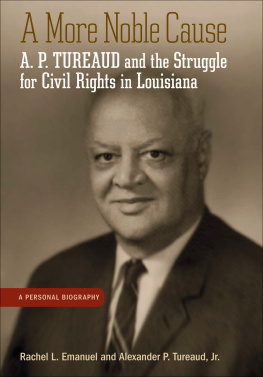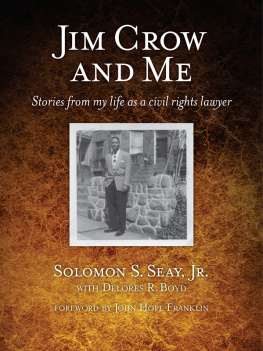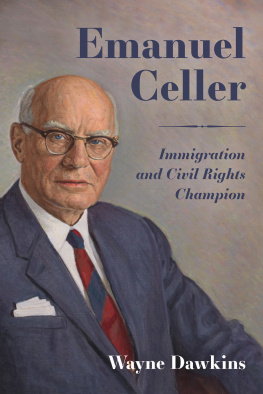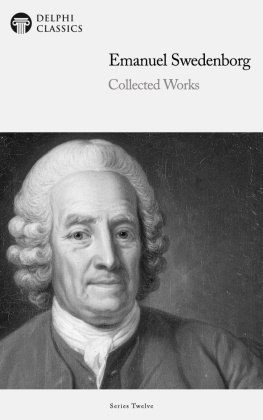Publication of this book is supported by DeeDee and Kevin P. Reilly, Sr.
Published by Louisiana State University Press
Copyright 2011 by Louisiana State University Press
All rights reserved
Manufactured in the United States of America
First printing
Designer: Laura Roubique Gleason
Typeface: Minion Pro
Printer: McNaughton & Gunn, Inc.
Binder: Dekker Bookbinding
Frontispiece: A. P. Tureaud, Sr., in the late 1950s.
Unless otherwise stated, all photographs are from the collection of Alexander P. Tureaud, Jr.
Library of Congress Cataloging-in-Publication Data
Emanuel, Rachel Lorraine, 1955
A more noble cause : A. P. Tureaud and the struggle for civil rights in Louisiana : a personal biography / Rachel L. Emanuel and Alexander P. Tureaud, Jr.
p. cm.
Includes bibliographical references and index.
ISBN 978-0-8071-3793-2 (cloth : alk. paper) ISBN 978-0-8071-3794-9 (pdf) ISBN 978-0-8071-3942-4 (epub) ISBN 978-0-8071-3943-1 (mobi)
1. Tureaud, Alexander Pierre, 18991972. 2. African American civil rights workersLouisianaBiography. 3. Civil rights workersLouisianaBiography. 4. African AmericansCivil rightsLouisianaHistory20th century. 5. Civil rights movementsLouisianaHistory20th century. 6. SegregationLouisianaHistory20th century. 7. Segregation in educationLouisianaHistory20th century. 8. School integrationLouisianaHistory20th century. 9. LouisianaRace relations. I. Tureaud, Alexander P., 1936 II. Title. III. Title: A. P. Tureaud and the struggle for civil rights in Louisiana.
E185.93.L6E63 2011
323.092dc22
[B]
2011004188
The paper in this book meets the guidelines for permanence and durability of the Committee on Production Guidelines for Book Longevity of the Council on Library Resources.

To my parents, Otis W. Emanuel and the late Leon L. Emanuel, and siblings, Regina E. Martin, Judge Leon L. Emanuel III, and Judge Ramona L. Emanuel Williams, who provided guidance that has forever sustained me, and to my daughter, Lawryn Emmanuelle Owens, whom I love with all my heart.
Rachel L. Emanuel
To Lucille Dejoie, wife, mother, and grandmother, who was the anchor and equal of her husband, A. P. Tureaud. In her own right she was a trail-blazer, strong and forthright, and she taught me and many others the value of integrity and love of family and friends.
A. P. Tureaud, Jr.
Preface
Local historians have called him one of the most important figures in twentieth-century Louisiana. The late New Orleans civil rights attorney Alexander Pierre Tureaud Sr. used his legal skills, community organizing, and sheer gumption to set the stage for civil rights gains for African Americans in the Deep Southern state of Louisiana. Long a stronghold of racial segregation, Louisiana was the very state where separate but equal originated, in the U.S. Supreme Courts 1896 decision in Plessy v. Ferguson. Tureauds work assisted in overturning Plessy and eliminating the egregious acts being perpetuated against African Americans with its sanction.
This book is about a man whose life exemplified perseverance. In a series of strategic moves, Tureaud worked for civil rights throughout his legal career, which spanned more than four decades. In an address to the Ninety-second Annual NAACP Convention held in New Orleans in 2001, Dr. Julian Bond stated, The history of the New Orleans NAACP Branch, and indeed the history of the Association statewide, is personified in the life and career of attorney A. P. Tureaud, for a time the only black lawyer in the state. His name was on virtually every NAACP lawsuit filed during those five decades of lawsuits which won voting rights; integrated schools, universities, buses, parks, and public buildings; and equalized the salaries of black teachers.
Shedding light on Tureauds life story for a national and international audience is a meaningful endeavor. This book will supplement what we know about the civil rights struggle played out in Louisiana.
Rachel Emanuel was introduced to A. P. Tureaud Sr. through the news release archives in the LSU Office of Public Relations, where she was employed as an editor. Emanuel, a 1977 graduate of LSU, was gathering information on pioneering black students who attended LSU in order to plan a reunion with other black alumni in 1988. A. P. Tureaud represented these students in lawsuits that desegregated Louisianas flagship institution.
Following their 1988 reunion, African American graduates of LSU honored Tureaud by naming an alumni chapter after him. Members of the A. P. Tureaud Sr. Chapter of the LSU Alumni Association joined with black students who initiated a campaign resulting in the naming of a university classroom building for him. The Alexander Pierre Tureaud Hall was dedicated on March 23, 1990, in recognition of the civil rights efforts of the late civil rights attorney. It is the first and currently the only building on the LSU campus named for an African American.
The Tureaud Chapter was the sponsoring organization for a grant proposal written by Emanuel to produce a documentary on Tureauds life. Journey for Justice: The A. P. Tureaud Story was produced and co-written by Emanuel with major funding from the Louisiana Endowment for the Humanities and the Louisiana Bar Foundation IOLTA fund. The fifty-minute video documentary, which had its public and broadcast premiere in 1996, highlights Tureauds life and career.
Interviewing civil rights leaders such as Judge Constance Baker Motley, Judge Robert Carter, attorney Jack Greenberg, and numerous others for the documentary was facilitated because of their respect and admiration for Tureaud. Lawyers, religious leaders, politicians, educators, journalists, businesspeople, and studentsboth black and whitespeak with admiration for the man and pride in his achievements. There are those among this group who were not impressed that he was Creole and looked like a white man and that he was educated at the elitist black Howard Law School. Even those who considered him to be a conservative who looked down on the activism of black radicals admit that he was the right man to deal with the complexities of the times. They respected his integrity and compassion and lauded him for his willingness to stay the course.
Emanuels 1996 dissertation was an ethnographic account of the making of the documentary. The author was encouraged to submit her work to LSU Press for publication. A number of fortuitous events carried the project from an initially proposed specialty textbook on how to create black documentary to a scholarly biography on Tureaud. Noting that Emanuels study contained a wealth of information about a central figure in Louisianas civil rights story, the staff of the LSU Press suggested a collaboration between Emanuel and Tureauds only son and LSUs first black undergraduate, A. P. Tureaud Jr., to produce a scholarly biography.
As a lawyer and historian, Tureaud realized the value of documenting his legal efforts, as well as those of his colleagues, in their struggle to secure constitutional guarantees for black Americans in Louisiana. For more than fifty years, he assiduously preserved his letters, speeches, and important documents. He also collected, with an unrelenting passion, historical information regarding civil rights initiatives and significant contributions made by people of color in Louisiana. On May 17, 1975, the A. P. Tureaud Papers were officially accepted into the archives of the Amistad Research Center in New Orleans, at a formal and festive ceremony attended by Tureauds widow Lucille, children, and other family members; friends; city officials; and members of the press. The Tureaud Papers were an invaluable resource for this project.










